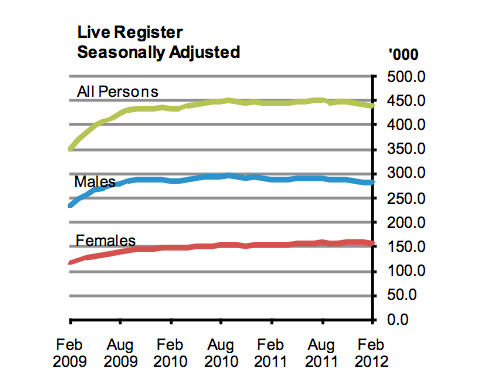Worrying gaps in the Government's jobs strategy

The lack of any firm commitment to upholding labour rights and employment conditions in any of the Government’s job plans is worrying. By Frank Groome.
With the announcement of the Action Plan for Jobs, the Pathways to Work strategy and the highly publicised Invest in Ireland forum held in the US in early February, the Government has, over the past few weeks, tried to shift the media message away from austerity to a focus on job creation. After several years of economic austerity, a general focus on job creation must be viewed as a positive development.However, when assessing the key features and potential success of this new focus, there is a broader context to keep in mind:
First, the cut your way to prosperity thesis, popular in Europe and adopted by the Government, has actually reduced the Government’s capacity to stimulate job creation outside of foreign direct investment. This has left the country heavily reliant on the goodwill of would-beinvestors and further reinforces the logic of austerity that prophesises no growth without cuts. The December 2011 budget tacitly recognised this situation in introducing stimulus measures built around tax breaks for individual entrepreneurs coming from abroad and by streamlining regulation in the financial services industry to attract more foreign investment.
Over the last few years the Irish economy has experienced a massive collapse in domestic demand. Personal spending, Government expenditure on goods and services and State investment in fixed capital fell collectively by approximately €38 billion over the 3 years up to 2010. Against this backdrop, the Government’s efforts to stimulate growth through the introduction of a provision for guaranteeing loans to small and medium size businesses, a strategic investment fund worth €250 million and a range of other smaller initiatives, is not nearly enough to stimulate the economy and replace this aggregate demand.
The lack of an adequate economic stimulus is evidence of the fact that in adhering to austerity, and failing to argue for a different approach, the Government has limited the policy options open to it for job creation. The notion that the introduction of austerity measures will demonstrate our seriousness to the markets and restore investor confidence is a naïve approach that is generating additional downward pressure on an already depressed economy.
Second, the absence of any firm commitment to upholding labour rights and employment conditions in any of the Government’s job plans or recent statements is of concern. This issue is clearly linked to the first point: an over-reliance on the largesse of foreign investors to create jobs is likely to increase the temptation for politicians to try and secure investment by eliminating or failing to enforce certain existing employment conditions - employment conditions that are viewed by many in the business community as a barrier to higher returns.
The Taoiseach’s address to global business leaders at the Invest in Ireland forum hints at this approach. After reaffirming Ireland’s commitment to continuing with painful austerity measures,the Taoiseach sketched out a new narrative about the Irish economy: Ireland is no longer just a country with an educated workforce and low corporation tax, we now have other enticing factors for business: “wages are lower, and labour is more plentiful”…. and “there might never be a better time to take advantage of it!” Nowhere in the speech did the Taoiseach mention a commitment to uphold labour rights and employment conditions. He did speak of efforts to change the “operating environment” for investors however - efforts to remove “costly” regulatory barriers are what the government has in mind.
In addition, the recent legislation issued on the Joint Labour Committees (JLCs) is an indication that the Government is willing to take decisions that reduce employment guarantees to workers if it believes that this will create additional jobs.
There is no reason why protecting labour rights and creating jobs cannot go hand-in-hand, and the Government should be cautious of arguments that suggest otherwise. Of course, it couldhappen that the negative consequences of our continuing economic situation increase public pressure on the Government to sacrifice ‘good’ jobs with decent working conditions, for more low-paying ones that can be created through adopting so-called ‘flexible’ employee conditions that suit employer needs over a shorter time frame - an argument already advocated by some employer groups. That is why a declaration of intent by the government to uphold and expand working conditions for all existing and new employees would provide considerable comfort to workers at a time that the country is being put up for sale to foreign investors.
Finally, with 438,300 people on the Live Register, the plan to create 100,000 new positions by 2016 and a further 100,000 by 2020 is simply too limited. In order to return unemployment levels back to 2008 levels (6.4%) the Government will need to create at least 5000 jobs a month over the next four years. Without such an increase over this period, mass long-term unemployment will become a permanent feature of our society and mass emigration the only solution to our problems.
Image top: CSO.
